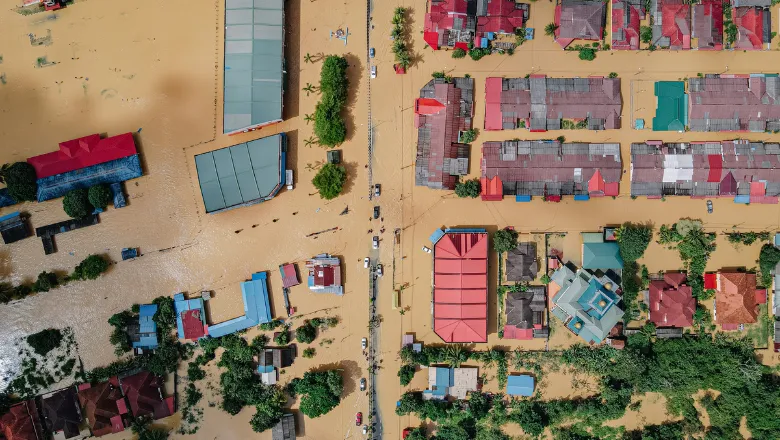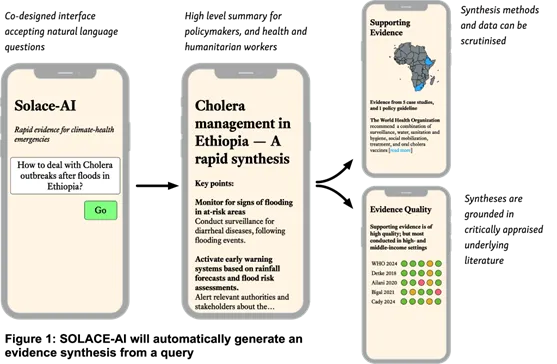We know through the work of our partners that there are many climate change events happening where conventional evidence needed to respond to these events isn’t available quickly enough. With SOLACE-AI, we hope to build a system that can respond to any needs related to climate-change health emergencies. The idea is that someone could type in their question to SOLACE-AI and then, near instantly, the system will produce a two-page, high-quality, evidence-based report.
Dr Iain Marshall, Clinical Senior Lecturer in Population Health Sciences at King’s
17 January 2025
New project will develop AI tool to help respond to climate-change health emergencies
A new consortium led by Dr Iain Marshall at King’s College London has been awarded £4m from Wellcome to develop an AI tool for generating the information needed to support policy and humanitarian responses to climate-change health emergencies.

The international project brings together investigators at King’s in the UK, Jigjiga University in Ethiopia, the Health Foundation South Africa, the World Heart Federation in Switzerland, and Northeastern University, Brown University and International Rescue in the US.
The team hopes the new tool will drastically reduce the time, effort and cost of producing the evidence needed to respond to climate-change health emergencies, improving decision-making and, ultimately, the lives of affected communities.
Addressing an unmet need
The team developed the project – titled ‘Synthesising Online Literature on Adaptation to Climate Emergencies’ or SOLACE-AI – in response to a one-off competitive funding call by Wellcome that aims to support the development of digital tools and solutions to advance evidence synthesis in the field of climate and health.
Climate change is driving extreme weather events, such as flooding, droughts and wildfires, in many places across the globe. Extreme weather events can have a profound impact on human health, both directly, through injury and death, and indirectly, through disease outbreaks, forced displacement and insecurity. These health risks disproportionately affect the most vulnerable and disadvantaged communities.
To decide how best to respond to climate-change health emergencies, policy makers and humanitarian organisations need to combine and review evidence from a variety of sources in a process known as evidence synthesis. It’s a timely process that can take over a year to complete, and even when a rapid response is needed it may take several weeks.
SOLACE-AI aims to address an unmet need by using artificial intelligence (AI) to review available evidence and then generate concise, actionable summaries in real-time to guide responses.
Six global case studies
To design and evaluate the system, the team will use six global case studies representing examples of climate-change health emergencies faced by the project’s collaborators:
- Ethiopia - addressing poor mental health and substance misuse in displaced communities
- South Africa - managing cholera risk after flooding
- Global - responding to arbovirus outbreaks
- India - cardiovascular impacts of extreme heat in vulnerable populations
- Somaliland - climate-change related anthrax risk
- Scotland - managing impact of climate change on respiratory disease
Pastoral communities living in the remotest parts of the world are struggling with the burden of climate change, to which they have contributed the least. The Somali region of Ethiopia is home to one of the largest pastoral communities in Africa, facing unique challenges related to climate change, health, and environmental sustainability. Through this multi-institutional research programme, we will work to spearhead the transformative actions needed to identify fair pathways and interventions to mitigate the adverse effects of climate change on local world communities.
co-investigators Professor Elyas Abdulahi, Professor of Population and Environmental Studies and Professor Nasir Warfa, Professor of Mental Health, Jigjiga University
SOLACE-AI, which will be made available online, will use a type of AI called a Large Language Model (LLM). LLMs are trained to understand, analyse and generate text. SOLACE-AI will be programmed to identify collections of documents needed to respond to climate-health emergency questions, including scientific and humanitarian reports, impact evaluations, policy documents, national and international guidelines, and documents related to local geographical, social and political knowledge.
“We will design the system so it can figure out which types of evidence are the best quality and then use that information to produce a dependable evidence report,” adds Dr Marshall.

AI is already transforming the way that we access and curate knowledge and information, and it can be an invaluable tool in protecting people/communities globally against the health impacts of climate change. We hope the development of the SOLACE-AI platform will transform how we make robust scientific evidence accessible, making it faster, cheaper, and easier for researchers and policymakers to get the answers they need for the challenges they face. For many regions, where the fight against climate change is constrained by both time and resources, this tool could be a crucial breakthrough to help the people that need it most.
Felipe Colón, Technology Lead, Wellcome
The project is due to begin in March 2025 and will run for five years. Read more about SOLACE-AI here.

